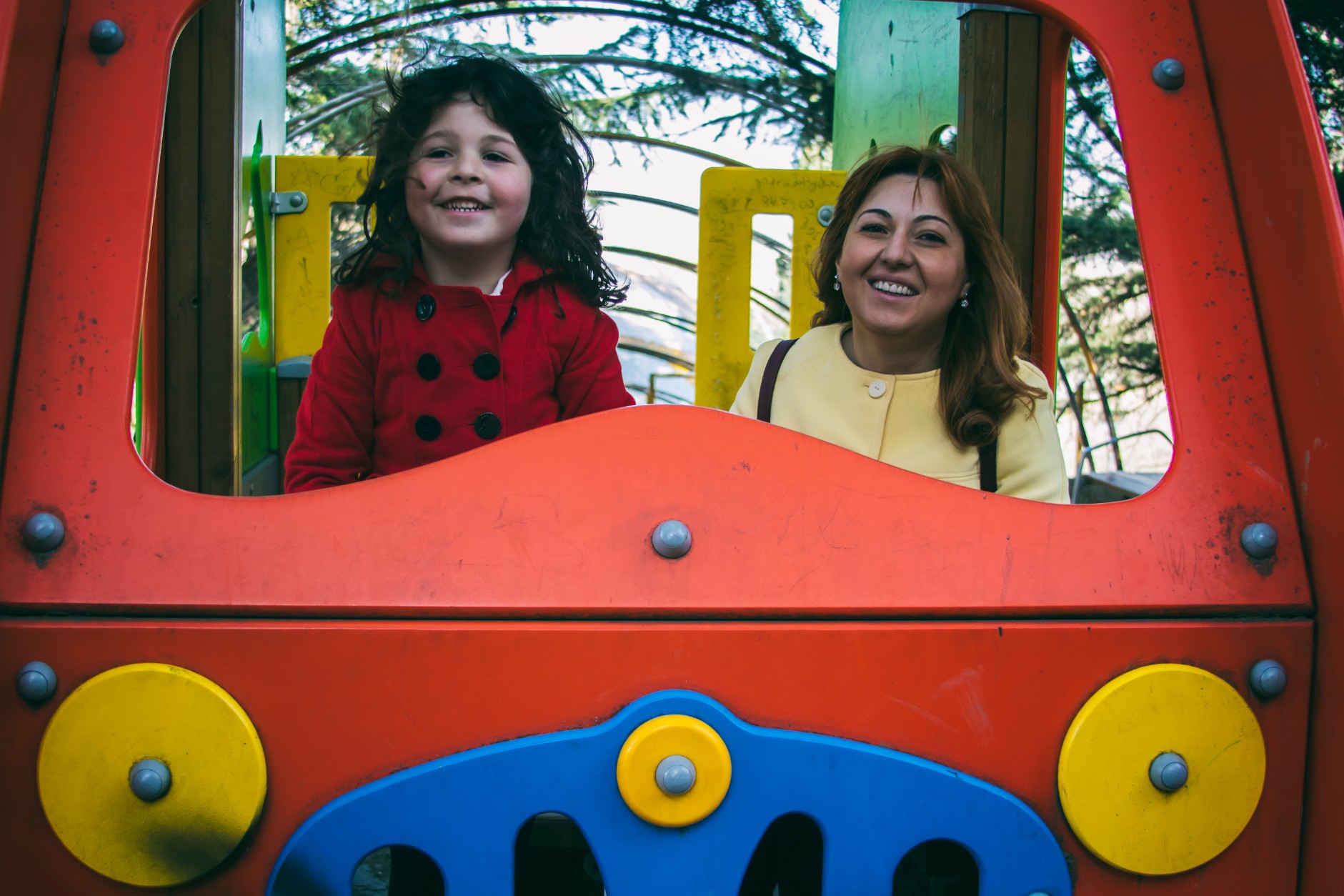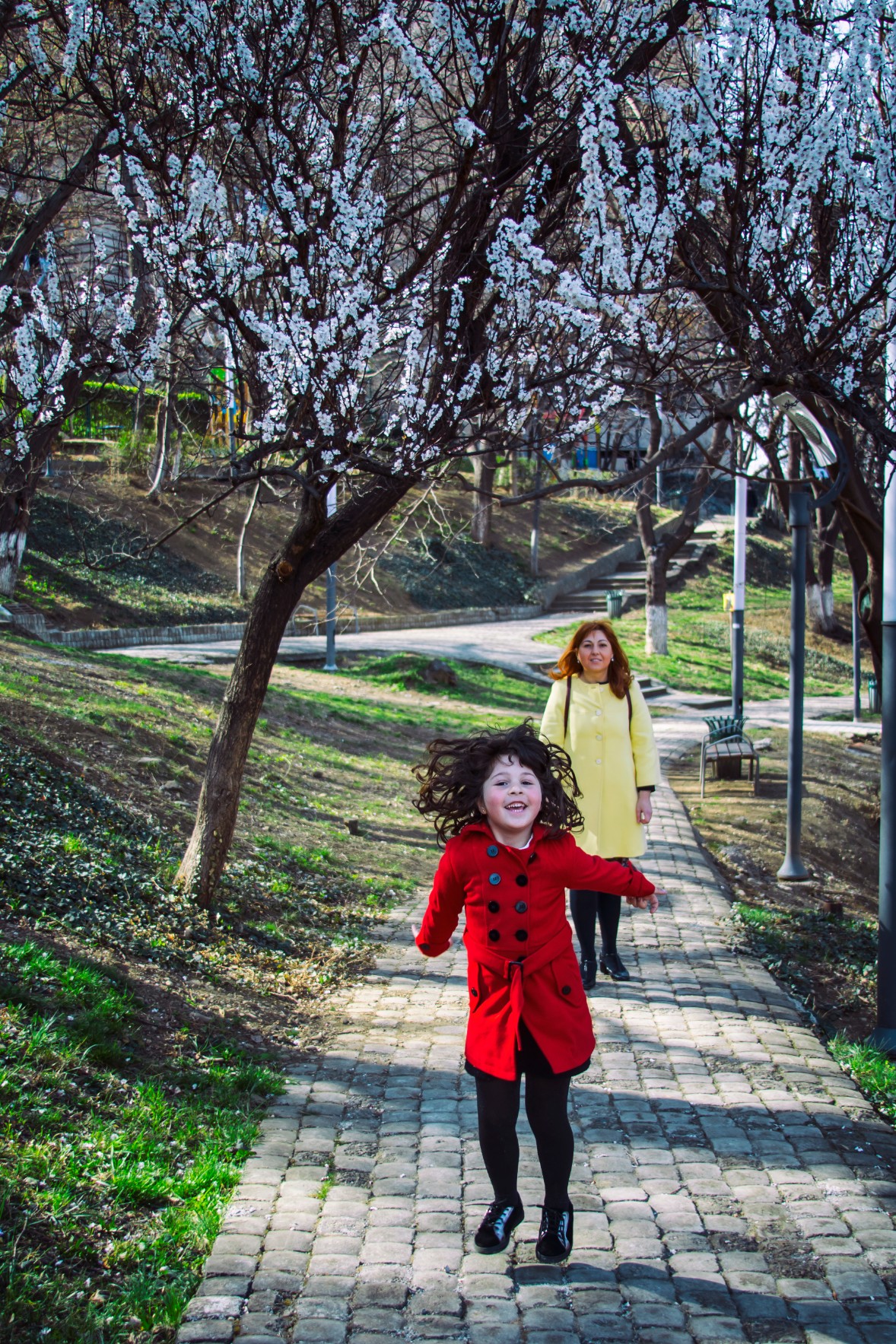Tamar Isakadze, 35, Tbilisi
„I think my choice of profession was determined by the stereotypes existing in my family. I decided to study child psychology and fight for the rights of children. I was particularly interested in the traumas suffered in childhood, and after I became a mother myself, I have also been interested in the humane and existential aspects of child rearing and education.
In my family, they thought that as a child is small he or she cannot reason well, so all the decisions must be taken for him or her. They believed a child could not have his or her opinion, especially if this opinion differed from theirs. My mother constantly found it difficult to accept my viewpoint even if it concerned a trivial matter. My different taste or choice was perceived as something threatening by her. Therefore, there was a period of time I kept my thoughts to myself for fear of being scolded or berated.
It lasted until I started to work in a project. It happened in years 2007-2008. During the project, I worked with kindergartens to integrate children from children’s homes there. I came across a game (usually offered by the teacher) that was widely played in most kindergartens. It was called “the King of Silence”. The teacher would instruct the children to sit motionless on their chairs and put their hands behind their back. Whoever stayed still and kept quiet, would win the game. I witnessed this game a few times and declared that it was a disaster. I demanded that this monstrous game be stopped! I had long conversations and meetings with kindergarten teachers, trying to bring it home to them that children are restless by nature and offering them help in planning educational games for kids. Back then, awareness about children and their rights was lower, however, even now, teaching children to voice their opinions and freedom of choice under democratic upbringing, is not welcomed by many teachers. Children’s rights are violated all the time and we don’t have strong institutions that would protect the interests of children in the country.
 Since 2009, I have held numerous trainings about inclusive education. Today, the teachers’ attitudes are not as blunt as they used to be. When aI travelled to regions together with my partner to hold 3-day trainings for teachers, it would take us one whole day just to deal with their aggression and calm them down. Most of them openly objected to the training in inclusive education and inclusion of children with disabilities into schools. We faced similar aggression during gender equality trainings held at schools.
Since 2009, I have held numerous trainings about inclusive education. Today, the teachers’ attitudes are not as blunt as they used to be. When aI travelled to regions together with my partner to hold 3-day trainings for teachers, it would take us one whole day just to deal with their aggression and calm them down. Most of them openly objected to the training in inclusive education and inclusion of children with disabilities into schools. We faced similar aggression during gender equality trainings held at schools.
Frequently, I would ask myself: Whose rights are protected in Georgia? The rights of children, the rights of senior citizens, the rights of people with disabilities, the rights of women, or the rights of women with children? Or who is supposed to protect their rights? From what I’ve seen, their rights are mostly violated, not protected. For centuries, men decided how children, women, elderly people or people with disabilities were to live; they distributed resources, the budget, rights or obligations. In the world run by men, women and children got the least benefits. The history tells us that they have always opposed to women being more active. For centuries, a man taking a wife meant that she was to take care of him and his family. Socially adept, self-actualized and smart women were not that popular with men. This is the stereotype created for centuries by the society and if we consider that the most active member of the society, the decision-makers were men, it is obvious what kind of society we are talking about.
I have often been told before that I’d better get married rather than learn. In the family, where the main values are “beauty” or “marriage”, it is very difficult to prove that you are more interested in studying and being independent. In Georgia, many parents see their girls as “born to be married”. When I was little, my family would often tell me “to grow up quickly so that I could get married soon”, or if I did something they did not approve of, they would scare me with words “you won’t be able to get married”, and later on, “you’re already full grown adult, get married so that your husband can support you financially”. It pissed me off because I wanted to find myself on my own, rather than by getting married to someone. I realized then that stereotypes and public opinions could destroy a woman’s life and turn her into a shadow of herself.
Since I started to work, I’ve been struggling all the time. While working with public institutions, it takes all my energy and effort to persuade them that children with disabilities are full-fledged members of the society with equal rights as others, and while doing that, I have to remain diplomatic and calm even with the most aggressive and radical opponents so that I don’t “anger” them further and can coax them into cooperation. However, there is some progress and I am rejoiced at it. If we compare results across years and even days, it is obvious that public opinion is becoming more tolerant. I hope the education system acknowledges that the culture of equality is created by the society made up of diverse people.
 If I look back on my life, I am sure to find many challenges that I’ve overcome. The experience that I’ve gained in the process has strengthened me and made my life more interesting. In the 90s, when people barely managed to make both ends meet, my family sold everything of value to survive. As a student, I often went on foot to the university and we did not even have money to buy textbooks or make copies of them. There were no jobs offered to students so that I could earn my pocket money. Still, I believed that if I became a specialist in the field that was interesting for me, I would be independent and happy. For freedom I fought with most vigor, as I did not want to be dependent on someone else financially. Being financially dependent on someone is the same as being in prison. If not my enthusiasm and determination to receive education, I would not be who I am now. I am one of those people who have not inherited anything, be it an item of value or any property.
If I look back on my life, I am sure to find many challenges that I’ve overcome. The experience that I’ve gained in the process has strengthened me and made my life more interesting. In the 90s, when people barely managed to make both ends meet, my family sold everything of value to survive. As a student, I often went on foot to the university and we did not even have money to buy textbooks or make copies of them. There were no jobs offered to students so that I could earn my pocket money. Still, I believed that if I became a specialist in the field that was interesting for me, I would be independent and happy. For freedom I fought with most vigor, as I did not want to be dependent on someone else financially. Being financially dependent on someone is the same as being in prison. If not my enthusiasm and determination to receive education, I would not be who I am now. I am one of those people who have not inherited anything, be it an item of value or any property.
However, fighting always matters. I have not been supported by anyone, on the contrary, I was prevented from making a choice based on my interests, and I was never let make my own decisions. Despite this, I managed to find my way.
Now I try to have a strong emotional bond with my child and be my baby’s confidante, supporter and friend. I want to create an environment that will be full of love and encouragement. I once wrote an article “let’s try harder to make children happy”. This is my goal for the coming years – to speak and write about children’s welfare. Parents must know how to create an environment free of violence and trauma – something I lacked in my childhood. What I want is the children’s rights to be protected and considered carefully in families, kindergartens and schools. The parents may not be able to provide financially for children’s needs but they have all the resources to make them happy by being kind to them, playing, talking with them and respecting their opinion. Not all parents will leave inheritance but they can leave happy memories.”

